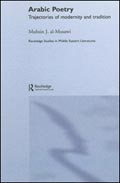(Routledge Studies in Middle Eastern Literatures) (Hardcover)
Routledge (Routledge Studies in Middle Eastern Literatures), 2006,
304 P.
 Table of Contents:
Table of Contents:
- The Tradition/Modernity Nexus in Arabic Poetics
- Debating Hegemonic Poetics
- Poetic Strategies for Conformity and Dissent: Past/Present Thresholds
- Poetic Dialogization: Ancestors in the Text-Figures and Figurations
- Dedications as Poetic Intersections: Precursors and Contemporaries
- Envisioning Exile: Past Anchors and Problematic Encounters
- The Edge of Recognition and Rejection: Why T.S. Eliot?
- Conclusion: Re-inscribing Tradition
Book Description
Since the late 1940s, Arabic Poetry has spoken for an Arab conscience, as much as it has debated positions and ideologies, nationally and worldwide. This book tackles issues of modernity and tradition in Arabic poetry as manifested in poetic texts and criticism by poets as participants in transformation and change.
Arabic Poetry studies the poetic in its complexity as pertaining to issues of:
- Selfhood
- Individuality
- Community
- Religion
- Ideology Nation
- Class
- Gender
This book also studies in context, issues that have been cursorily noticed or neglected, like Shi'i poetics, Sufism, women's poetry, and expressions of exilic consciousness. It employs current literary theory and provides comprehensive coverage of modern and post-modern poetry from the 1950s onwards.
Arabic Poetry is essential reading for those with interests in Arabic culture and literature and Middle East studies.
About the Author
Muhsin J. al-Musawi is Professor of Middle East and Asian Studies at Columbia University and University Professor at the American University of Sharjah.
****
Read More: